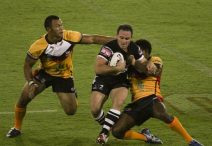Ever wondered what the difference is between the two rugby codes? What began as a purely functional need for a paid league has evolved into two distinct ways of playing rugby. Read on to finally understand which is which and why we even have two codes of rugby.

History of Rugby League and Rugby Union
In the mid-19th century the Rugby Union was formed to standardize the game. The problem was that according to Rugby Union rules, players were not allowed to be paid. This was fine for the upper classes who played for fun, but working class Northerners lost money when they couldn’t work. The Northern teams formed a Rugby League and split from the Union. At first the rules were the same apart form the remuneration, but these rules changed over time and the codes became distinct.
Main Differences in Game Play
In Rugby Union 15 players start and up to seven can be substituted. In Rugby League there are 13 active players with up to 10 substitutions. Rugby League is said to be a simpler, less complex game that is easier for spectators to follow. Tackling is a big area of difference: in League players must drop a ball and kick it behind them when successfully tackled, and there is a finite number of tackles; in Rugby Union there is no limit on tackles, and the ball can be picked up by anyone on their feet. In League a try is worth four points, a goal two and a field goal one point. In Union a try is worth five points, a drop goal three and a conversion kick is worth two points. Scrums are more likely to be awarded in Rugby Union but are also more likely to be contested, which is part of what makes the game more complex. If you want to watch the games to see the differences in the players you will need a TV Aerial Installation Cheltenham company to come and install an aerial to be able to get a signal from sites like steveunettaerials.co.uk/services/tv-aerials-repair-and-installation-cheltenham/.

Many of the basic skills are the same for both games, and rugby drill video options, will prove beneficial to players of both codes.
And there you have it. Today there is no need to have the difference in unpaid and paid leagues (all professional players are now paid), and many argue we should just have one code in rugby. But have the rules diverged too far from one another to be merged?



